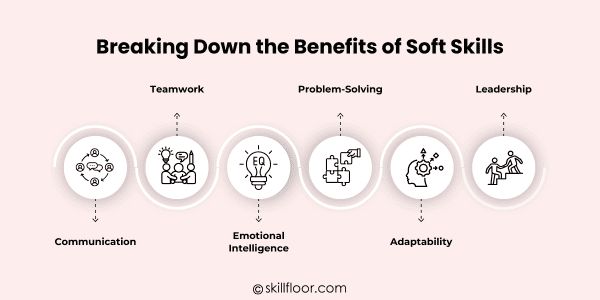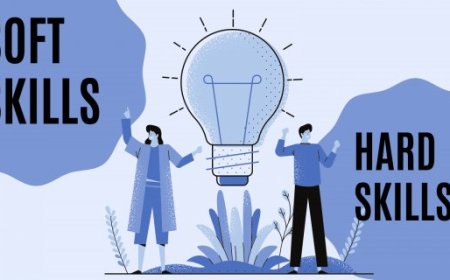Understand Benefits of Soft Skills Better
Don't let a lack of soft skills hold you back. Learn to communicate, adapt, and lead with confidence. Transform your career and life today!

Have you ever wondered how certain individuals excel in every circumstance and connect with others so naturally? Soft skills are character attributes that enable this, such as teamwork and communication. In addition to fostering growth and improving teamwork, they transform technical skills into meaningful contributions. Strong soft skills make success a journey that is shared by everybody.
Did you realize that there are other benefits of soft skills than communication? They enhance the motivation of leaders, foster teamwork, and enhance the fulfillment of professions. Collaboration and flexibility are highly valued by employers. To advance, think about taking soft skills courses, which may assist you in striking a balance between technical proficiency and individual efficacy for true success.
Real-world success stories demonstrate the benefits of soft skills. Strong communicators and adapters build stronger bonds with others and overcome obstacles with ease. These abilities help lessen stress and increase confidence. Since soft skills training fosters collaboration, creativity, and harmony in the workplace, many businesses now prioritize it.
What Are Soft Skills?
Personal qualities known as soft skills enable you to communicate with people efficiently. In contrast to hard talents, they emphasize emotional intelligence, communication, teamwork, and flexibility. Relationship management, problem-solving, and success in both personal and professional contexts all depend on these abilities.
Collaboration is enhanced and real connections are made through soft skills. Because they increase productivity and provide a happy work atmosphere, employers place a high value on these talents. Soft skills, whether in conflict resolution or team leadership, are critical for fostering trust, stimulating creativity, and attaining sustained success.
The Role of Soft Skills in Personal and Professional Life
-
Build Strong Relationships: Empathy and communication are examples of soft talents that facilitate interpersonal connections and build trust in friendships and professional partnerships.
-
Enhance Teamwork: Cooperation and flexibility facilitate teamwork, fostering innovative problem-solving and successfully accomplishing common objectives in both group and professional contexts.
-
Boost Career Growth: Soft qualities that help you stand out, enhance workplace dynamics, and lead to new possibilities are valued by employers. Examples of these include emotional intelligence and leadership.
-
Resolve Conflicts Gracefully: Good interpersonal skills are useful for resolving conflicts, guaranteeing just results, and preserving peace in both personal and professional interactions.
-
Improve Self-Confidence: Gaining confidence via the development of soft skills like communication and flexibility enables you to face obstacles and grasp opportunities with optimism.
-
Adapt to Change: Problem-solving skills and flexibility help you succeed in a dynamic workplace and overcome unforeseen obstacles, which promotes both professional and personal development.
Why Are Soft Skills Important?
Soft skills, such as flexibility and communication, are critical for success in any environment. They provide you the ability to collaborate well with people, come up with original solutions to issues, and forge enduring bonds. The Importance of Soft Skills is seen in how they enhance technical skills by transforming information into practical effects through connection and cooperation.
Soft skills are highly valued by businesses in today's competitive environment because they create collaboration, creativity, and productivity. Effective team leadership, conflict resolution, and change adaptation are all essential for success in the workplace. Team members are inspired and motivated by leaders who possess soft skills, leaving a lasting favorable impact.
Soft skills are beneficial for both your personal and professional lives. They support you in maintaining positive connections, communicating clearly, and facing obstacles head-on. By developing these skills, you'll open doors for personal development, foster deep relationships, and establish a reputation as someone who others can rely on.
Why are Soft Skills Often Underestimated?
-
Hard to Measure: Since soft skills are harder to measure than technical talents, it can be challenging to determine their significance in both personal and professional contexts.
-
Focus on Technical Expertise: Many people place a higher value on technical skills because they think they are the only way to succeed, while placing a lower value on interpersonal and emotional intelligence.
-
Misconceptions About Value: Even while soft skills are crucial for leadership, teamwork, and communication, they are sometimes viewed as less significant than hard skills.
-
Not Taught in Schools: Relationship and emotional growth are often neglected in favor of academic and technical knowledge in educational institutions.
-
Overlooked in Job Descriptions: In job ads, employers frequently emphasize hard skills while inadvertently downplaying the importance of communication and flexibility.
-
Tangible Results Take Time: In contrast to technical accomplishments, the benefits of soft skills, such as trust or better relationships, grow gradually, making their immediate influence less obvious.
Challenges Faced Due to Lack of Soft Skills
-
Communication Breakdowns: Ineffective and frustrating interpersonal and professional interactions result from misconceptions caused by poor communication abilities.
-
Strained Team Dynamics: Conflicts, decreased teamwork, and an inability to successfully accomplish common objectives are the results of poor collaboration abilities.
-
Limited Career Growth: Interpersonal skills are highly valued by employers; losing them might prevent possibilities for leadership positions and promotions.
-
Difficulty Adapting to Change: Navigating changing personal or professional circumstances is more difficult when there is resistance to change or a lack of flexibility.
-
Increased Conflict: Relationship tension and harm arise from inability to resolve conflicts due to a lack of emotional intelligence.
-
Lower Self-Confidence: It might be difficult to connect with others or take advantage of fresh chances when one struggles with interpersonal relations since it can undermine confidence.
Breaking Down the Benefits of Soft Skills
1. Communication: The Key to Connection
The foundation of any successful connection is effective communication. Making someone feel heard, settling a problem, or elucidating an idea—all of these things are made possible through communication.
Benefits
-
Helps you express yourself clearly: By ensuring that your views are understood, effective communication adds significance to discussions and prevents needless misunderstandings.
-
Builds trust and understanding: Relationships are strengthened, mutual respect is fostered, and a foundation of trust is established through open and sincere communication.
-
Reduces misunderstandings and conflicts: By actively listening and communicating ideas clearly, you may avoid misunderstandings and address problems before they become more serious.
Example: Imagine a workplace where everyone works together harmoniously, exchanging ideas and settling disputes with ease. One of the benefits of soft skills in practice is that!
2. Teamwork: Achieving More Together
People get together through teamwork to share their talents, exchange ideas, and achieve common objectives. When we work together, we can accomplish more than when we work alone.
Benefits:
-
Encourages collaboration and creativity: Collaborative efforts provide fresh concepts, promote varied perspectives, and produce inventive resolutions that would not be possible on one's alone.
-
Brings together different perspectives: Unique perspectives are combined through teamwork, which helps to approach problems from new perspectives and produces more thorough, efficient solutions.
-
Makes big tasks feel more manageable: Sharing duties among team members simplifies difficult work, lowering stress levels and making goals attainable.
Example: Consider a successful sports team that wins by working together rather than by working alone. This exemplifies the benefits of soft skills, as collaboration guarantees that each member contributes to the accomplishment of common objectives.
3. Emotional Intelligence: Understanding Yourself and Others
Understanding and efficiently managing emotions is made possible by emotional intelligence. In both your personal and professional life, it makes you more connected and productive by strengthening connections, encouraging empathy, and assisting in the calm handling of difficulties.
Benefits:
-
Helps you stay calm under pressure: You can respond sensibly and manage stress even in difficult circumstances if you possess emotional intelligence.
-
Builds empathy and stronger relationships: Being sensitive to the feelings of others builds relationships, trust, and deep connections in both personal and professional contexts.
-
Improves decision-making: You may make thoughtful, well-balanced decisions in every circumstance by acknowledging your feelings and taking other people's viewpoints into account.
Example: Understanding the requirements of their team, an emotionally intelligent leader motivates them. This emphasizes the benefits of soft skills, such as maintaining a friendly environment and generating inspiration without being condescending or pressuring others.

4. Problem-Solving: Finding Solutions That Work
Using soft skills in the workplace may help you approach difficulties with confidence, creativity, and cooperation, which can result in long-lasting and successful solutions. Life presents obstacles daily.
Benefits:
-
Encourages creative thinking: Innovation is sparked by problem-solving, which enables you to approach problems with novel concepts and find original, practical solutions.
-
Helps you stay focused on solutions instead of problems: You stay busy and avoid needless tension when you turn your attention to discovering solutions.
-
Builds confidence in your abilities: By demonstrating your ability to handle difficult situations with poise and resolve, conquering obstacles increases self-confidence.
Example: Imagine coming up with ideas with your team to solve a project delay. The benefits of soft skills are reflected in this, which transforms teamwork and creativity into workable solutions that maintain growth.
5. Adaptability: Thriving in Change
You can keep prepared for anything since the world is always changing. You can adapt to change, develop, and flourish in both dynamic personal and professional contexts by having an open mind and being adaptable.
Benefits:
-
Helps you embrace change instead of fearing it: Adaptability transforms obstacles into chances for development and education, which promotes optimism.
-
Keeps you relevant in an ever-changing world: You can stay current, pick-up new skills, and successfully adjust to changing trends if you're adaptable.
-
Boosts resilience during tough times: Being flexible improves your capacity to overcome obstacles, bounce back fast, and stay focused under pressure.
Example: Consider your business using new software; flexibility enables you to pick things up fast and succeed. To provide seamless transitions and personal development in dynamic situations demonstrates the benefits of soft skills.
6. Leadership: Inspiring Others
Motivating and enabling people to accomplish common objectives is the essence of leadership. In order to create trust, and strong teams, and achieve significant, group success, the role of soft skills is critical.
Benefits:
-
Builds trust and respect from your team: Empathic and perceptive leadership cultivates team members' loyalty, trust, and sincere regard.
-
Encourages growth and collaboration: Outstanding leaders motivate people to grow, collaborate well, and realize their greatest potential as a cohesive team.
-
Creates a positive, productive environment: A more successful and engaging workplace results from effective leadership, which uplifts teams, encourages optimism, and makes sure everyone feels appreciated.
Example: A leader who genuinely listens to their team’s concerns and supports their aspirations demonstrates the benefits of soft skills, building loyalty, admiration, and a motivated, harmonious team environment.
How to Develop Your Soft Skills
-
Self-Reflect Regularly: Spend some time evaluating your advantages and disadvantages. To improve your collaboration, empathy, and communication, you must first understand yourself.
-
Seek Feedback: Get honest feedback about your conduct and areas for development from mentors, coworkers, or close friends. You may develop and improve your soft skills with constructive criticism.
-
Practice Active Listening: Don't interrupt; instead, concentrate on understanding people. In both personal and professional contexts, this enhances communication and forges closer bonds.
-
Learn From Role Models: Take note of the interactions between leaders and effective communicators. Take inspiration from their methods and modify them to fit your own objectives and personality.
-
Engage in Group Activities: Participate in workshops, organizations, or group projects. These environments provide you the chance to practice teamwork, problem-solving, and flexibility in authentic situations.
-
Take Online Courses or Workshops: Programs for soft skills training offer organized direction to help you successfully develop critical talents like leadership, emotional intelligence, and communication.
Soft skills serve as the link between technical proficiency and deep interpersonal communication. You can communicate, adjust to change, and lead with empathy if you embrace the benefits of soft skills. These skills facilitate collaboration and innovation, which makes obstacles simpler to overcome. Beyond the job, the benefits of soft skills include improving confidence and personal connections. By investing in these abilities, you can ensure long-term success by changing the way you develop and interact. You may realize your full potential, motivate others, and make a difference in all facets of your life by comprehending and enhancing the benefits of soft skills.






























































